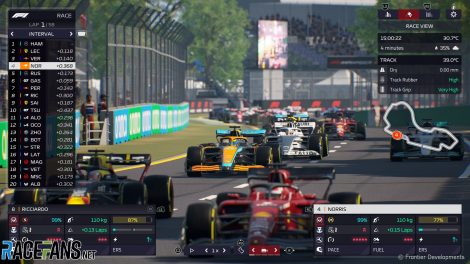Later this month, Frontier Developments will release the first officially-licensed Formula 1 management game for over two decades with F1 Manager 2022.
The first in an annual franchise of games due to reappear in 2023 and 2024, F1 Manager will provide players with a unique opportunity to play out their own virtual F1 fantasies from the position of a team principal, instead of as a driver.
With that, developers at Frontier have been in an unusual position of making a Formula 1 game where they have not had to worry about physics, handling or necessarily on making the most realistic and detailed car models. Instead, the game’s presentation has been a major focus from the very beginning, to ensure the complex, mathematical simulation engine underpinning F1 Manager’s gameplay can be enjoyed in the most immersive and authentic way possible.
While graphics are naturally the most important part of a game’s presentation, audio has been a crucial point of emphasis for F1 Manager’s developers. RaceFans spoke with Frontier’s principal audio designer, Tim Bartlett, leading up to the release of the game to find out more about how F1 Manager’s sound design is so important to creating the feeling that the player themselves is on the pit wall.
The first thing to notice about the sound effects in F1 Manager is that rather than synthetically recreating engine sounds within the game like every popular racing game you could think of, Frontier took advantage of unprecedented access to Formula 1’s own broadcast archive to use actual sounds recorded from onboard footage, TV cameras and actual team radio clips between drivers and engineers.
“All our in-game team radio is taken from previous race weekends,” Bartlett explains. “We wanted this to be an authentic experience for F1 fans, and so part of that is making sure our system is as close to reality as possible.
“When we first began scoping out our plans for the F1 Manager series, we knew we wanted to create an audio experience which mirrored TV broadcast as closely as possible,” he continues. “The majority of people identify the sounds of F1 as what they hear when they’re watching on TV, so that was really our starting point.
Advert | Become a RaceFans supporter and
“Using real audio gave us a much wider range of content to capture from and ensures that each car sounds as they do on the broadcast coverage. Our engines, for example, are created…
Click Here to Read the Full Original Article at RaceFans…

